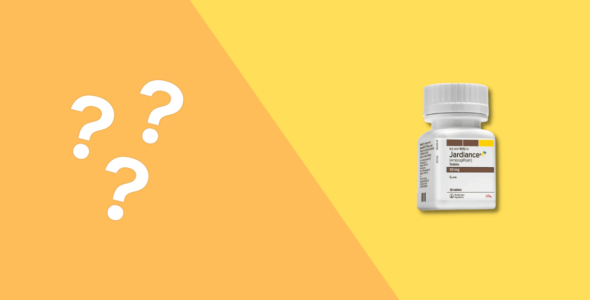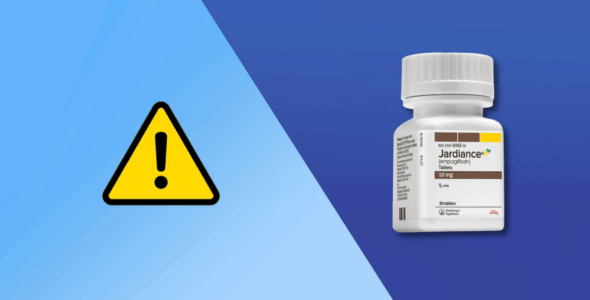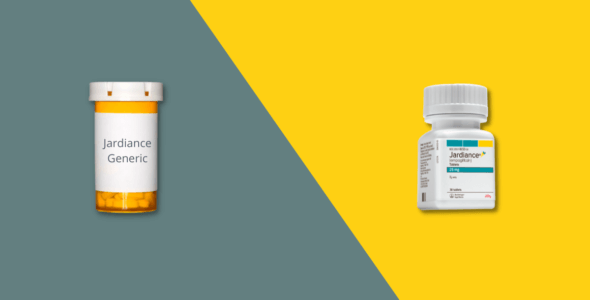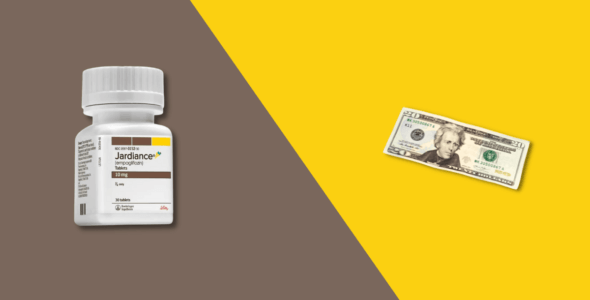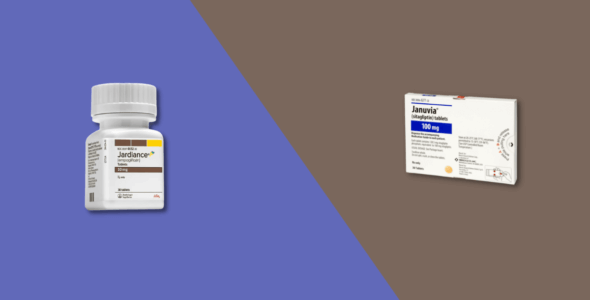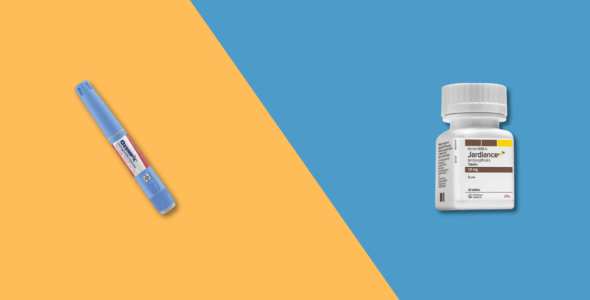Steglatro and Jardiance are brand names for prescription drugs used for the treatment of type 2 diabetes mellitus. Both belong to a drug class called sodium-glucose cotransporter 2 (SGLT2) inhibitors.
Here we will explain how they work, their similarities and differences, their side effects, and more. This should provide you with the basics to better understand your options.
What is Steglatro?
Steglatro is an FDA-approved medication manufactured by Merck. It is indicated as an adjunct to diet and exercise to improve glycemic control in adults with type 2 diabetes mellitus. It is not recommended in diabetes patients with type 1 diabetes mellitus or to treat diabetic ketoacidosis.
Steglatro can be used on its own but is also available as a fixed-dose combination with sitagliptin. Clinical trials show that a decrease in HbA1c (a measure of blood glucose levels) is greater when taken with metformin than with a placebo.
The active ingredient of Steglatro is ertugliflozin, an SGLT2 inhibitor. SGLT2 (sodium-glucose co-transporter-2) is the main transporter responsible for the reabsorption of glucose from the glomerular filtrate back into circulation. By inhibiting SGLT2, ertugliflozin reduces renal reabsorption of filtered glucose and reduces the renal threshold for glucose, thereby increasing urinary glucose excretion.
Steglatro dosage
Steglatro is available as a pink triangular 5 mg tablet with “701” on one side and plain on the other. It is also available as a red triangular 15 mg tablet with “702” on one side and plain on the other. The tablets should be stored at room temperature. Store in a dry place and avoid moisture.
The dose may be increased to Steglatro 15 mg dose once daily in patients who tolerate the 5 mg but need additional glycemic control. Always speak with your healthcare provider about any changes to your dose so they can monitor and evaluate your condition.
What is Jardiance?
Jardiance is an FDA (U.S. Food and Drug Administration) approved medication manufactured by Boehringer Ingelheim Pharmaceuticals, Inc. Jardiance is also a diabetes medicine prescribed to adults with type 2 diabetes. It’s used to reduce blood sugar levels when used alongside exercise and diet changes, and to reduce the risk of death by heart disease.
- In combination with diet and exercise to improve glycemic control in adults with type 2 diabetes mellitus
- To reduce the risk of cardiovascular death in adults with type 2 diabetes mellitus and established cardiovascular disease
- To reduce the risk of cardiovascular death plus hospitalization for heart failure in adults with heart failure and reduced ejection fraction
Jardiance can help you lower your blood glucose levels when taken alongside dietary and lifestyle changes. It causes you to excrete more sugar in your urine than you would normally. This lowers your blood sugar and helps to reduce your risk of health conditions like cardiovascular disease.
The active ingredient in Jardiance is called empagliflozin. It lowers your blood sugar levels by causing you to lose more sugar in your urine than you usually would. Your kidneys help recycle sugar back into your blood from your urine, with the help of a protein called SGLT-2. Empagliflozin blocks this protein from working, reducing how much sugar your kidneys recycle. This makes you lose more sugar in your urine, rather than it being excreted back into your blood.
Jardiance dosage
Jardiance is available in tablet form, in the following doses: 10 mg, and 25 mg. The recommended dose of Jardiance is 10 mg once daily, in the morning, with or without food.
Common side effects of Steglatro and Jardiance
The most common side effects of Steglatro in clinical trials include:
- Female genital mycotic infections
- Fournier’s gangrene – tell your doctor right away if you have a yeast infection
- High blood sugar (hyperglycemia) – increased thirst or urination, blurred vision, headache, and tiredness
- Low blood sugar (hypoglycemia)
- Weight loss
More serious side effects of Steglatro include:
- Increased cholesterol levels
- Dehydration – dizziness, weakness, feeling light-headed – Increased risk if you have low blood pressure (hypotension), take prescription drugs to lower blood pressure, including water pills (diuretics), have kidney problems, are on a low-salt diet, or are 65 years of age or older
- New pain, tenderness, sores, ulcers, or infections in your legs or feet
- Little or no urination
- Ketoacidosis – nausea, vomiting, stomach pain, confusion, unusual drowsiness, malaise, or trouble breathing
- Serious urinary tract infections, including urosepsis and pyelonephritis that can result in hospitalization – pain or burning when you urinate, increased urination, blood in your urine, fever, pain in your pelvis or back
The most common side effects of Jardiance in clinical trials include:
- Genital yeast infections in both men and women
- Needing to urinate more often and urinating more than usual
- Feeling more thirsty than usual
- Itching
- A skin rash – this may be itchy and include raised bumps and blisters that leak fluid, and may cause your skin to redden
- An increase in cholesterol levels
More serious side effects of Jardiance include
- Severe allergic reactions to the medication
- Low blood pressure (hypotension)
- A rare but serious bacterial infection that damages tissue under the skin (necrotizing fasciitis) in the area between the anus and genitals (perineum)
- Diabetic ketoacidosis
- Hypoglycemia
- An increased risk of serious urinary tract infections
- Increased risk of bone fracture
- A high and potentially harmful increase in your cholesterol levels
- Dehydration
These aren’t all the side effects Steglatro or Jardiance can cause. You can find more details in the patient leaflet that comes with your medication. Talk to your physician or pharmacist if you have any concerns about side effects.
Steglatro and Jardiance drug interactions
Steglatro can interact with other medications. These include:
- Insulin and Insulin secretagogues (eg, sulfonylurea) – increased risk of hypoglycemia
- Amlodipine
- Glipizide
- Levothyroxine
- Lisinopril
- Losartan
- Metoprolol
Jardiance can interact with other medications. These include:
- Any other diabetes medications, like insulin or sulfonylureas
- Diuretics
- Corticosteroids
- Estrogens
- Oral contraceptives
- Nicotinic acid
- Calcium channel blocking drugs
- Rifampin
Steglatro and Jardiance can interact with other medications. This can change how Steglatro and Jardiance and other medications work and can make side effects more likely. Tell your prescribing physician about all your drugs, including vitamins and dietary supplements.
Steglatro and Jardiance contraindications
You should not use Steglatro if you:
- Are allergic to the active ingredient ertugliflozin
- Are allergic to any of the other ingredients in Steglatro
- Have severe kidney disease or if you are on dialysis
- Have moderate renal impairment – glomerular filtration rate (eGFR) below 30 mL/min/1.73 m 2
Talk to your doctor before using Steglatro if you:
- Are taking any of the medications that could interact with Steglatro
- Have had a previous amputation, a foot ulcer, heart disease, circulation problems, or nerve damage – Steglatro may increase your risk of lower limb amputation. Talk to your healthcare provider about good foot care
- Have liver disease
- Have bladder infections or other urination problems
- Have low blood pressure
- Have diabetic ketoacidosis
- Have problems with your pancreas, including surgery
- Drink alcohol often
- Are on a low salt diet
- Are pregnant or are planning to become pregnant
- Are breastfeeding or are planning to breastfeed
You should not use Jardiance if you:
- Are allergic to the active ingredient empagliflozin
- Are allergic to any of the other ingredients in Jardiance
- Have Type 1 diabetes (Jardiance is for type 2 diabetes only)
- Are under 18 years of age
Talk to your doctor before using Jardiance if you:
- Have problems with liver or kidney function
- Have or have ever had problems with your pancreas, like pancreatitis or surgery on your pancreas
- Have a history of urinary tract infections or any problems with urination
- Often drink alcohol, or drink a lot of alcohol in a short period of time
- Are going to have surgery in the near future
- Are eating less than usual or have changed your diet
- Are pregnant or are planning to become pregnant
- Are breastfeeding or are planning to breastfeed
Other drugs for diabetes
- Amaryl (glimepiride)
- Farxiga (dapagliflozin)
- Glucophage (metformin)
- Invokana (canagliflozin)
- Invokamet (canagliflozin and metformin)
- Januvia (sitagliptin)
- Trulicity (dulaglutode)
- Ozempic (semaglutide)
- Lantus (insulin glargine)
- Segluromet (ertugliflozin + metformin)
- Steglujan (sitagliptin)
- Xigduo XR (dapagliflozin + metformin)
If you have any concerns about Steglatro or Jardiance side effects, talk to your physician, or pharmacist for medical advice. Also inform your healthcare provider about any medical conditions, supplements, and over-the-counter meds you are taking. You are also encouraged to report side effects to the FDA: visit http://www.fda.gov/medwatch or call 1-800-FDA-1088.
